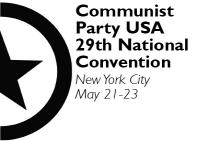 This article is part of the discussion leading up to the Communist Party USA’s 29th National Convention May 21-23, 2010. CPUSA.org takes no responsibility for the opinions expressed in this article or other articles in the pre-convention discussion. All contributions must meet the guidelines for discussion. To read other contributions to this discussion, visit the site of the Pre-Convention Discussion period.
This article is part of the discussion leading up to the Communist Party USA’s 29th National Convention May 21-23, 2010. CPUSA.org takes no responsibility for the opinions expressed in this article or other articles in the pre-convention discussion. All contributions must meet the guidelines for discussion. To read other contributions to this discussion, visit the site of the Pre-Convention Discussion period.
All contributions to the discussion should be sent to discussion2010@cpusa.org for selection not to the individual venues.For more information on the convention or the pre-convention discussion period, you can email convention2010@cpusa.org.
Some years ago, participating in a solidarity march in Detroit during a newspaper strike, I passed a group five or six people standing on a corner street shouting the slogan written on signs they were displaying, “Revolution is the only solution.” With this slogan, what they were doing was actually diverting attention away from the purpose of the march by a slogan which effectively states that strikes are useless unless the goal of revolution is paramount. Some of the contributions to this preconvention discussion effectively reflect this impatience with the U.S. working class and other victims of capitalist exploitation who do not see the goal of socialism as the solution to their day-to-day problems.
What distinguishes Marxist-Leninists from other socialist orientations is the recognition that class struggles in themselves do not lead to a socialist consciousness, that a party of the working class is needed to bring this socialist consciousness to the working class and to other exploited strata. To do this, such a party must participate in the most meaningful way in the mass struggles of the people to deal with their immediate problems, while, at the same time bringing to the participants in these struggles insofar as possible the theoretical understanding of the limits of reform under capitalism. This coupling of theory with struggle is not, however, straightforward, without complexities. The complexities cannot be short-circuited.
In the United States, there is widespread recognition that big capital is not on the side of the masses of people, but at the same time, there is also widespread belief among the people that their welfare depends on big capital creating the conditions necessary for their existence. I recall a worker being interviewed on TV about why he supported Reagan for president: “Sure he’s for the rich, but they give us our jobs.”
A prime task of Communists is to counteract the feeling of helplessness that prevents people from participating in mass struggles to meet their needs. In order to involve people in any mass struggle, the goal of the struggle has to be not only clear, but winnable. To attempt to involve people in struggle merely to raise consciousness, is demagogy and will be recognized as such. Therefore, the Party’s goal of a socialist future has to part of a long-term strategy to couple struggles for winnable goals to meet the real immediate needs with the ultimate development of a socialist consciousness. This is the basis for our strategy of forming alliances with center and left forces around concrete political and economic struggles. In doing so, we nevertheless have to project our socialist consciousness into these struggles, but in a way that does not obstruct the unity that is necessary in the coalitions that are formed.
In the battle for health care, Communists in Minnesota, like Communists in the rest of the country, joined the struggle for a universal singer-payer health plan, and when that became impossible to achieve, we joined the struggle for the inclusion of the public option. Those on the left who rejected support of Obama’s health-care effort because his proposals were not based on the single payer principle, remained in the sidelines, weakening the battle for healthcare and not winning allies among the masses. While supporting the Democratic Party’s national healthcare bill as it emerged in final passage, the Minnesota District nevertheless supported the effort of John Marty, the most progressive gubernatorial candidate, to obtain the endorsement of the Democratic Farmer Labor Party as the Democratic Party is called here after its merger in 1944 with the Democratic Party), and who also most strongly put forth the necessity of a single-payer plan for Minnesota as the basis of his campaign. One of eight candidates for the DFL endorsement for governor, Marty did not win the endorsement, but he successfully pushed the single-payer issue to the forefront at the DFL state convention, and thereby induced the winning candidate, Margaret Anderson Kelliher, to announce during the balloting her support of the single-payer principle for the health plan that she will put forth for Minnesota as governor. We have not won the battle yet, but it is a struggle in Minnesota that is winnable, but not winnable without center-left allies in the DFL. Of course, the struggle for the single-payer principle is not the same as a struggle for socialism, but acceptance of the ideological content of the single-payer issue is a condition for a socialist consciousness. Those on the left who identify themselves as socialists and stood aside from the Democratic Party’s effort for healthcare legislation made no allies for socialism among those who could not afford health insurance or otherwise lacked access to adequate healthcare.


 Join Now
Join Now